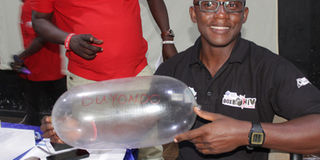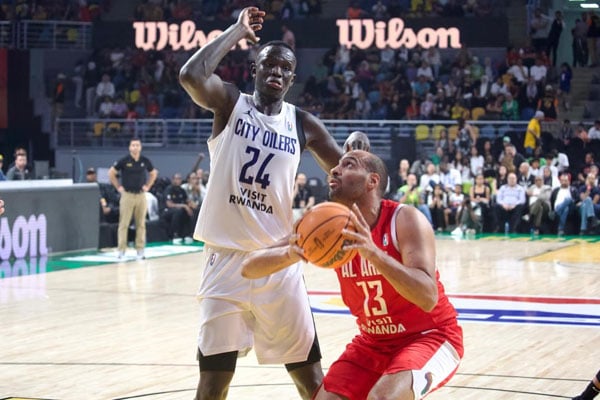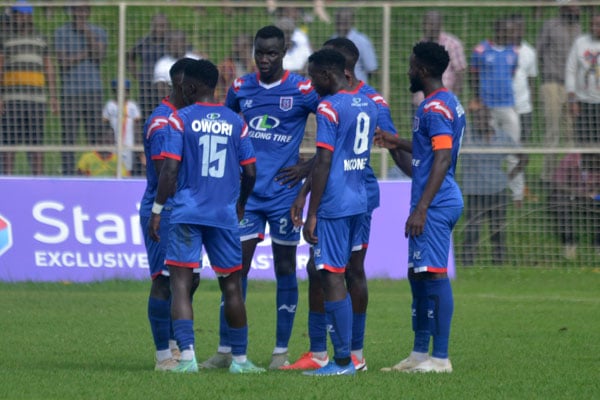Boxing moves from politics to policy

At a glance: Dr Chris Mbowa, UBF head of the medical committee, demonstrating a blown condom during the anti-HIV workshops at Kati-Kati. PHOTO BY ABDUL-NASSER SSEMUGABI
Kampala. From the latter part of 2017 through the better part of 2018, the future of Uganda’s amateur boxing looked bleak. From January 20 parallel elections came parallel federations. One led by the flamboyant novice Moses Muhangi, another by continuing president Kenneth Gimugu.
One based in the traditional quarters at Lugogo, another in the slums of Namungoona. All this amidst court battles, court orders and counter-orders, most of which ending in Muhangi’s favour, and Gimugu vowing to appeal.
Freezing the federation’s accounts and the subsequent auditor general’s investigations, aimed to bring Muhangi and his team to their knees. Instead, magistrate Alex Mushabe ordered that the accounts be unfrozen, much to Muhangi’s relief. Mushabe also advised the warring parties that their disagreements “cannot best be settled through litigation, but through administrative means.”
The genesis
It is ironical that in these battles Fred Kavuma, who was the publicist in Gimugu’s term, fought on both sides. At first he was the target of Gimugu’s rage because he ‘smuggled’ Muhangi into boxing, “for selfish motives.”
But soon Kavuma fell out with Muhangi, quit his vice presidency, rejoined his former boss Gimugu and turned his guns on Muhangi.
Muhangi accused Kavuma of financial infidelity yet Kavuma, who wielded unlimited power in Gimugu’s tenure, counter-accused Muhangi of “wanting to run the show alone.”
Then the bans: First, Muhangi banned Gimugu, Paul Ayiasi, Kavuma—three of the four registered trustees of Uganda Boxing Federation (UBF)—and their allies, from participating in anything boxing for 12 years because their endless court battles were ‘killing’ boxing.
And counter-bans: the following week, at Wabigalo Community Centre in Kampala, Gimugu, Kavuma and Ayiasi—the banned trustees—told the press they had suspended Muhangi, general secretary Simon Barigo and treasurer Richard Muhumuza, pending IGG’s investigations into “embezzlement of public funds, conspiracy to defraud, among other felonies.”
They promised an extraordinary general meeting to fill the positions vacated by Muhangi and co., on an interim basis, according to UBF and Aiba rules. But Muhangi just laughed them off and six months on, nothing more has happened.
In his ruling, Mushabe assessed that “all the parties seem to be acting in the interest of Uganda Boxing Federation.” But if that was the case, then both factions took quite long to realise that as they fought, boxing was instead bleeding profusely, and soon losing the count.
Counting the losses
The National Cadets, Intermediates and the Schools Championships, were delayed until late June. The National Open was eventually abandoned. Earlier, the elite and youth teams prepared hardly a month to the Commonwealth Games in Gold Coast and the African Championship in Casablanca respectively. No wonder, the poor performance: a bronze from Gold Coast, and a silver and a bronze from Casablanca.
Likewise, the three boys—Reagan Musoke, Muhammad Mazida and John Fisher Odoch—who had qualified from Casablanca for the World Youth Championship in August, did not prepare enough and their performance in Budapest did not flatter.
Previously, boxers went partisan, yelling at Mengo Court, protesting and disrupting court proceedings favour of Muhangi. On May 29, magistrate Mushabe warned against such hooliganism. But again, under the boxers repeated the act for over 30 minutes: carrying placards reading “Free Boxing, President M7 Help Plz,” “Mama Janet Save Our Sport, We Want To Box,” etc outside the court fence, blocking traffic as Muhangi’s BMW cruised away. On Facebook, that evening, the president commended the boys’ action.
Sanity, safety
Eventually, after incurring some terrible legal blows, Team Gimugu retreated. And in the second half of the year boxing returned to the ring. Muhangi continued his take-boxing-to-the-people policy and the Intermediates tournament was a big success. Exhilarating action attracted big crowds in the slums of Bwaise and Katwe, the cradles of boxing.
Boxers’ safety is paramount and as such, the federation unveiled the “Box HIV out of Uganda” campaign. The five-year project funded by UNAIDS, will not only target the reduction of HIV/Aids, but also other communicable diseases like hepatitis B and C.
In the first phase that ended earlier this month, facilitators from the Infectious Diseases Institute, Aids Information Centre and the Uganda Aids Commission, trained coaches, referees, club owners, school games masters and sports tutors with the aim to create awareness and sensitise the boxing fraternity on the dangers of HIV and give preventive and curative measures like abstinence, condom use, and proper medication, among others, towards the lofty target of ending the scourge by 2030.
Thirty five punching bags branded with the campaign logos were also distributed to different clubs.
The second phase, beginning January to June 29, will involve distribution of condoms to boxers and more sensitisation campaigns. While the third phase will focus on monitoring and evaluation and schools boxing teams.
If it delivers its promises, the project targeting over 3500 boxers, 70 coaches and referees, 35 club owners and the over 200 schools, could be the best thing to have happened to boxing in recent years.
And it is such revolutionary ideas that might prove Muhangi’s presidency the fundamental change boxing craved.
At least a bronze
In what was nearly a fruitless campaign, where four other boxers bowed out medalless, Juma Miiro won the all-important bout and squeezed into the medal bracket.
Miiro, who had gotten a bye straight to the quarterfinals, edged Kenya’s Shaffi Hassan 3:2 in a close flyweight contest. That he lost the semifinal to India’s Amit Phangal matter less, after all, the most underrated among the Bombers, got the bronze, Uganda’s only boxing medal from the Gold Coast Games.
This bronze invited him to his family’s table of Commonwealth Games medalists. From Amsterdam, his younger brother Fazil Juma Kaggwa, whose bronze was Uganda’s only boxing medal at the 2014 Games in Glasgow, celebrated the family achievement on Facebook as did their grandfather and trainer Hussein Khalil, who won gold for Kenya in the 1982 in Brisbane.
Amid these celebrations, though, Reagan Ssimbwa and Nassir Bashir, Miiro’s East Coast BC and KCCA BC colleagues, vanished in Australia.
Ladies back in the ring
Almost four years since four Ugandan ladies featured in the 2014 Aiba World Women’s Boxing Championships in Jeju, Korea, there has been virtually no business in the ladies’ corner, except one or two fights on men’s tournaments.
The excuses have ranged from limited numbers to lack of opponents, to lack of motivation and being just neglected.
But change seems to be calling: in the middle of the year, about 10 ladies returned to Lugogo, to try their chances. After nearly two months, six joined their male teammates on the bus to Bujumbura. That only Jalia Nali (Busia) fought at the inaugural East Africa Games in August—others did not have opponents—was due to organizational faults.
Coach Lawrence Kalyango, who led the Burundi contingent, lauded the ladies for quick improvement in terms of fitness and technic, but said they can only get better if they keep working in their gyms.
He added that to be assessed well, they need more tournaments here, in the region and on the continent.
Boxing - the Medallists
Reagan Musoke: AFBC Youth Championships-silver
Muhammad Mazida: AFBC Youth Championships-bronze
Juma Miiro: Commonwealth Games- bronze
Jacquellyn Ssanyu
Joanita Nanyanzi
Savio Dominic Kimurahebwa
LADIES TEAM TO BUJUMBURA
Mariam Nakiberu (48kg)
Mourine Adhiambo (51kg)
Jalia Nali (54kg)
Suzan Akello (57kg)
Lydia Nantale (64kg)
Emily Nakalema (69kg)
AWOL
Reagan Ssimbwa (Australia)
Nassir Bashir (Australia)
John Fisher Odoch (Hungary)




